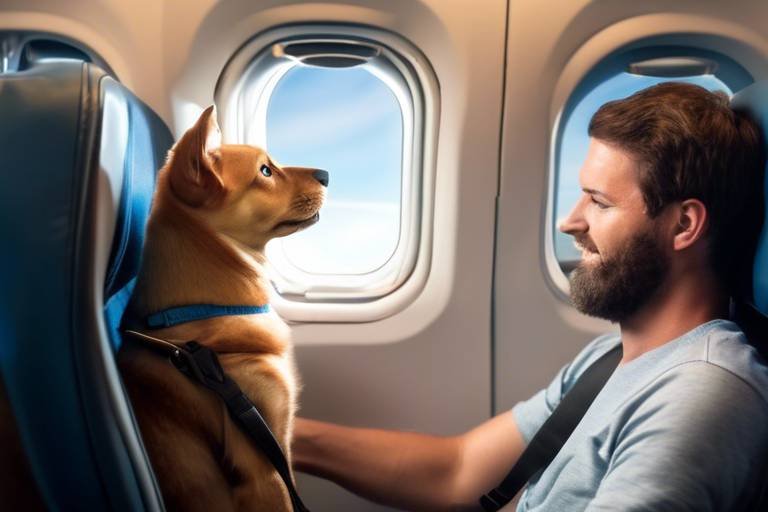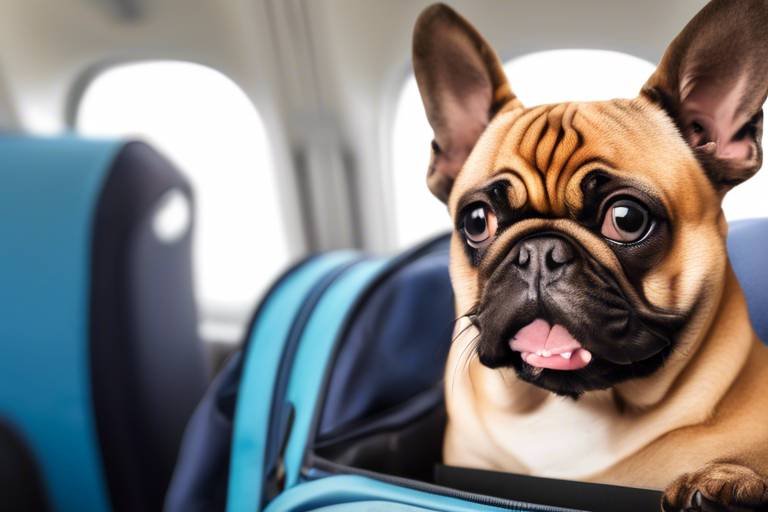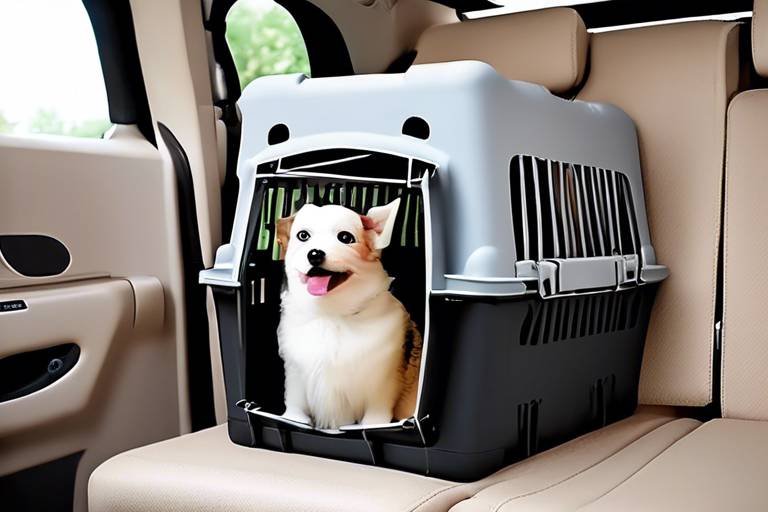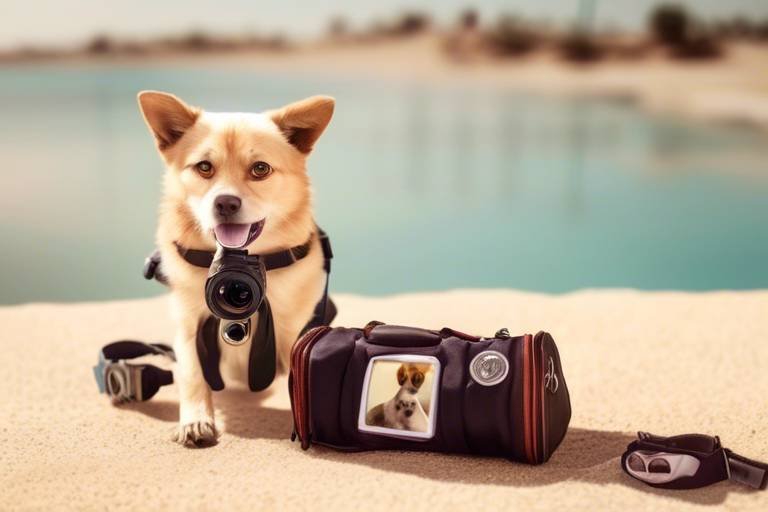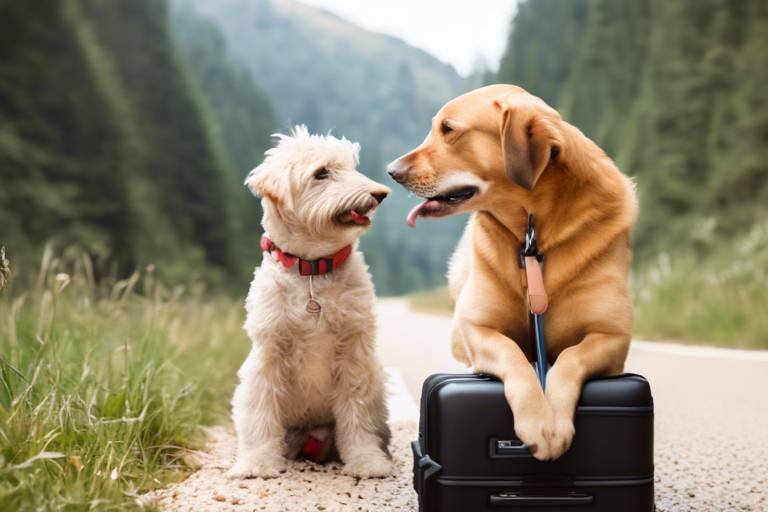How to Deal with Pet Allergies While Traveling
Traveling with pets can be a delightful adventure, but for those with pet allergies, it can also feel like navigating a minefield. Imagine planning a perfect getaway only to be derailed by sneezing, itching, and discomfort. The good news is that with the right strategies, you can enjoy your travels while managing your allergies effectively. This article will explore practical tips and tricks that can help you maintain your comfort and health while still enjoying the companionship of your furry friends.
Before diving into travel tips, it's essential to understand what pet allergies are. They are typically caused by proteins found in a pet's skin cells, urine, and saliva. These proteins can trigger a range of symptoms, such as sneezing, runny nose, itchy eyes, and even skin rashes. Identifying your specific triggers is crucial, as it can help you decide how to minimize exposure during your travels. For example, if you know that cat dander is your main concern, you can take extra precautions when traveling with a feline friend.
Preparation is key when it comes to managing pet allergies. Before you embark on your journey, consider these essential tips to minimize allergy symptoms:
Your choice of accommodation can make a significant difference in your travel experience. Look for pet-friendly hotels or rentals that cater specifically to allergy sufferers. These places often have strict cleaning protocols and may even offer hypoallergenic rooms. When browsing options, check customer reviews for mentions of cleanliness and allergy management. This can save you from unpleasant surprises upon arrival.
When evaluating lodging types, both Airbnb and hotels have their pros and cons. Hotels generally have standardized cleaning procedures, which can be reassuring for allergy sufferers. However, Airbnbs can offer unique accommodations, but the cleanliness can vary widely. It's essential to communicate with hosts about their cleaning practices to ensure a safe environment. Here’s a quick comparison:
| Factor | Airbnb | Hotels |
|---|---|---|
| Cleaning Standards | Varies by host | Standardized protocols |
| Pet Policies | Host-specific | Generally strict |
| Allergen Management | Not always prioritized | Often have hypoallergenic options |
Finding accommodations that offer pet-free zones can significantly enhance your comfort. These areas are specifically designed to minimize allergen exposure, allowing you to relax without the constant worry of triggering your symptoms. Always inquire about the presence of such zones during your booking process.
Don’t forget to pack your allergy medications! Bringing the right medications can be a game-changer in managing your symptoms while traveling. Antihistamines, nasal sprays, and inhalers should be at the top of your packing list. Make sure to carry them in your hand luggage for easy access. It’s also wise to consult your doctor before traveling to discuss any additional medications that might be beneficial for your specific situation.
Once you're on the road, implementing strategies to manage your allergies becomes crucial. Keeping your environment clean and allergen-free will help you maintain comfort throughout your journey.
Keeping your surroundings clean is vital. Upon arrival at your accommodation, take a few moments to wipe down surfaces and vacuum if possible. If you're staying in a hotel, request a room that has been thoroughly cleaned and ask for extra cleaning supplies if needed. Remember, a little effort can go a long way in creating a comfortable space for yourself.
One of the best investments for allergy sufferers is a portable air purifier. These handy devices can significantly reduce allergens in the air, making your stay much more pleasant. When choosing an air purifier, look for models that can filter pet dander and other common allergens. Using it in your room can create a sanctuary where you can breathe easy and enjoy your time away.
After your trip, it’s important to address any lingering allergy symptoms. Consider taking a few days to recuperate at home, especially if you’ve had significant exposure to allergens. Regularly washing your clothes and bedding can help eliminate any lingering dander. Additionally, maintaining a clean home environment will aid in your recovery and keep allergens at bay.
- What are the most common symptoms of pet allergies? Symptoms often include sneezing, itchy eyes, runny nose, and skin rashes.
- Can I travel with my pet if I have allergies? Yes, but it requires careful planning and preparation to minimize exposure to allergens.
- What medications should I take while traveling? Antihistamines, nasal sprays, and any prescribed inhalers are commonly recommended.
- How can I ensure my accommodation is allergy-friendly? Research reviews, ask about cleaning practices, and look for pet-free zones.

Understanding Pet Allergies
Pet allergies can be a real headache, especially for those who love to travel with their furry friends. But what exactly causes these pesky allergies? In essence, pet allergies are typically triggered by proteins found in a pet’s skin cells, urine, and saliva. When these proteins become airborne or settle on surfaces, they can provoke allergic reactions in sensitive individuals. Common symptoms include sneezing, itchy eyes, runny nose, and even skin rashes. Imagine being on a beautiful beach getaway, only to be sidelined by uncontrollable sneezing—definitely not the way you want to spend your vacation!
Understanding the root causes of your allergies is crucial. For instance, did you know that different pets can produce varying levels of allergens? Dogs and cats are the usual culprits, but even smaller pets like rabbits and guinea pigs can contribute to allergy woes. The severity of your symptoms may depend on factors such as:
- Type of Pet: Some breeds are known to produce fewer allergens. For example, poodles and bichon frises are often recommended for allergy sufferers.
- Duration of Exposure: The longer you are around a pet, the more likely you are to experience symptoms.
- Environmental Factors: Dust, pollen, and mold can exacerbate your allergic reactions, especially in unfamiliar environments.
Recognizing these triggers can empower you to make informed decisions while planning your travels. If you’re heading to a pet-friendly hotel or considering a friend's home with pets, it’s wise to inquire about their cleaning routines and pet management practices. A well-maintained environment can significantly reduce allergen levels, making your stay more bearable.
Moreover, understanding the symptoms of pet allergies can help you gauge your condition before it spirals out of control. If you find yourself dealing with symptoms like persistent coughing or wheezing, it might be time to take action. Keeping an eye on how your body reacts to various situations can be a game changer, allowing you to enjoy your travels without the constant worry of allergens lurking around every corner.
In summary, getting a handle on pet allergies involves understanding both the triggers and symptoms. With this knowledge in your back pocket, you can navigate your travel plans more effectively, ensuring that you and your furry companion can enjoy your adventures together, allergy-free!

Preparing for Travel
When it comes to traveling with pets, especially for those who suffer from allergies, preparation is everything. Just like packing your bags, you need to pack your strategy to minimize allergy symptoms. Start by consulting with your doctor about your specific allergies and any medications you might need. This proactive approach can help you feel more secure and prepared for the journey ahead.
It’s also essential to consider your pet’s grooming needs before you hit the road. A good bath and brushing can significantly reduce the amount of dander and hair that might trigger your allergies. Think of it as giving your furry friend a spa day before the adventure! Additionally, make sure to have all necessary supplies on hand, such as pet-friendly wipes and allergen-free bedding, to further mitigate any potential allergy triggers.
Next, you’ll want to do your research on accommodations. Not all places are created equal when it comes to cleanliness and allergen management. Look for hotels or rentals that advertise themselves as allergy-friendly. This often means they have rigorous cleaning protocols in place and may even use hypoallergenic cleaning products. A quick search online can help you find reviews from fellow travelers who share similar concerns.
Moreover, consider the time of year you’re traveling. For instance, spring and summer can bring about increased pollen levels, which can exacerbate allergy symptoms. If possible, plan your trip during a season when allergens are less prevalent. This could mean traveling in the fall or winter, when both pollen and pet dander are typically lower.
To further enhance your travel experience, prepare a travel kit that includes all the essentials for managing your allergies. This kit should contain:
- Your prescribed medications
- Allergy relief sprays or eye drops
- Portable air purifiers
- Hypoallergenic wipes for your pet
- Extra bedding or blankets to reduce allergens
Finally, don’t forget to communicate with your travel companions about your allergies. This ensures that everyone is on the same page and can help create a supportive environment. Whether it’s reminding them not to let the dog jump on your lap or ensuring that the windows are kept closed during allergy season, open communication is key.
In summary, preparing for travel with pets when you have allergies involves a combination of strategic planning, effective communication, and a little bit of extra care for both you and your furry friend. By taking these steps, you can ensure a more enjoyable and comfortable travel experience, allowing you to focus on making memories rather than managing allergies.
Choosing the Right Accommodations
When it comes to traveling with pets, choosing the right accommodations can make a world of difference, especially for those dealing with pet allergies. Imagine stepping into a hotel room that feels like a sanctuary, free from the telltale signs of furry friends. The right place not only ensures your comfort but also minimizes your exposure to allergens. So, what should you look for when selecting your ideal lodging?
First and foremost, it's essential to consider the cleanliness standards of the accommodation. Look for places that have a strong reputation for cleanliness, as this can significantly affect your allergy symptoms. Many hotels and rental properties now highlight their cleaning protocols, especially in the wake of increased health awareness. Don't hesitate to ask about their cleaning practices, including how often they change linens and clean carpets.
Next, think about whether the accommodation is pet-friendly or has strict pet policies. Some hotels and Airbnb properties cater specifically to pet owners, but others may allow pets with fewer restrictions. If you're allergic, it's crucial to choose a place that either prohibits pets or has designated pet-free zones. This will help create a buffer between you and potential allergens, allowing you to breathe a little easier.
Another critical factor is the availability of pet-free rooms. Many modern hotels are now offering rooms specifically designated as pet-free. These rooms often feature hardwood floors instead of carpets, which can trap allergens, making them a better option for allergy sufferers. When booking, be sure to specify that you want a pet-free room to ensure your comfort.
To help you navigate your options, here’s a quick comparison of Airbnb versus traditional hotels regarding pet accommodations:
| Criteria | Airbnb | Hotels |
|---|---|---|
| Pet Policies | Varies by host; some are pet-friendly, others are not. | Often have specific pet policies; many offer pet-free rooms. |
| Cleanliness Standards | Dependent on individual hosts; check reviews. | Generally higher standards with regular cleaning protocols. |
| Flexibility | More options for unique stays; can find pet-friendly homes. | Standardized services; may have limited pet-friendly options. |
Ultimately, the choice between Airbnb and hotels will depend on your personal preferences and needs. However, keeping your allergies in mind should always be a priority. Don't shy away from doing a little research and reading reviews to find the best fit for you.
In summary, selecting the right accommodations while traveling with pets is about balancing comfort and managing your allergies. Prioritize cleanliness, look for pet-free zones, and don't hesitate to ask questions. With the right preparation, you can ensure your getaway is enjoyable and allergy-friendly!
Airbnb vs. Hotels
When it comes to choosing accommodations for your travels, the age-old debate of often pops up, especially for those who suffer from pet allergies. Both options have their unique benefits and drawbacks, and understanding these can help you make an informed decision that prioritizes your health and comfort. Airbnb offers a wide variety of unique spaces, from cozy apartments to spacious homes, often in residential areas. This can mean less exposure to allergens typically found in busy hotels. However, the cleanliness standards may vary significantly from one host to another, making it crucial to read reviews and perhaps even communicate directly with the host about their cleaning practices.
On the other hand, hotels generally adhere to strict cleaning protocols, which can be a significant advantage for allergy sufferers. Many hotels now offer allergy-friendly rooms equipped with air purifiers and hypoallergenic bedding. This can provide peace of mind, knowing that the environment has been specifically tailored to minimize allergens. However, you might find that the presence of other guests with pets can still pose a risk, especially in shared spaces.
To help you compare the two options more effectively, here’s a quick breakdown of the pros and cons:
| Criteria | Airbnb | Hotels |
|---|---|---|
| Cleanliness Standards | Varies by host; read reviews | Generally consistent; strict protocols |
| Allergy-Friendly Options | Depends on the property | Often available, including hypoallergenic rooms |
| Space and Privacy | More options for larger spaces | Standardized rooms, less privacy |
| Cost | Varies; can be cheaper or more expensive | Prices can be higher for allergy-friendly rooms |
Ultimately, the choice between Airbnb and hotels may come down to personal preference and your specific allergy needs. If you prioritize a controlled environment with guaranteed cleanliness, a hotel might be the way to go. However, if you're looking for a unique travel experience and are willing to do a little extra research, an Airbnb could offer you a comfortable stay while keeping allergens at bay.
Pet-Free Zones
Finding accommodations that offer can be a game changer for those who suffer from pet allergies. Imagine stepping into a space where the air feels fresher, and your worries about sneezing or itchy eyes are instantly alleviated. Pet-free zones are designed specifically to create a comfortable environment for guests who may be sensitive to pet dander and other allergens. These areas ensure that you can relax and enjoy your stay without the constant concern of encountering allergens that could trigger your symptoms.
When searching for the perfect place to stay, it’s essential to look for hotels or rental properties that explicitly advertise pet-free rooms or sections. Many establishments understand the importance of catering to guests with allergies and have taken significant steps to ensure their comfort. This can include rigorous cleaning protocols and the use of air filtration systems to maintain a clean atmosphere. By choosing a place that prioritizes allergen management, you can enhance your overall travel experience.
Furthermore, the benefits of staying in a pet-free zone extend beyond just avoiding allergens. You’ll also find that these areas tend to be quieter and less chaotic, making it easier to unwind after a long day of travel. You can think of it as a peaceful oasis amidst the hustle and bustle of your adventures. To help you identify accommodations that offer these zones, consider the following:
- Research Online: Use travel websites that allow you to filter your search for pet-free options.
- Contact Hotels Directly: Sometimes, the best way to confirm pet policies is to call the hotel and ask about their allergen management practices.
- Read Reviews: Check traveler reviews to see if others with allergies had a positive experience in the pet-free areas.
In conclusion, prioritizing pet-free zones during your travels can significantly improve your comfort and enjoyment. By taking the time to find suitable accommodations, you can ensure that your journey remains as pleasant as possible, allowing you to focus on creating memories with your furry companions without the burden of allergy symptoms weighing you down.
Traveling with Medication
Traveling with pets can be a delightful experience, but for those who suffer from pet allergies, it can also be a bit of a minefield. That's where the right medication comes into play. Before you hit the road, it’s essential to ensure you have all the necessary medications packed and ready to go. Think of your allergy meds as your trusty sidekick—always there to save the day when things get a little hairy!
First off, consult with your healthcare provider before your trip. They can offer personalized advice and may prescribe medications that are best suited for your specific allergies. It's crucial to understand the difference between over-the-counter options and prescription medications. For instance, antihistamines like cetirizine or loratadine can help alleviate sneezing and itching, while nasal corticosteroids might be recommended for more severe symptoms. Having a clear understanding of what you need can make all the difference in your travel experience.
When packing your medications, consider creating a travel medication kit. This kit should include:
- Your prescribed allergy medications
- Over-the-counter antihistamines
- Nasal sprays
- Eye drops for allergy relief
- Any emergency medications, such as an EpiPen if you're at risk for anaphylaxis
Make sure to keep these medications in their original packaging, as this can help avoid any confusion at security checkpoints and ensure you have all the necessary information about dosages. Additionally, it’s wise to carry a copy of your prescriptions, especially if you’re traveling internationally. You never know when you might need to restock!
Timing is also key when it comes to taking your medications. For many allergy sufferers, it’s best to start taking antihistamines a few days before exposure to allergens, as this can help build up your defenses. Think of it like preparing for battle—getting your armor on before you step into the fray!
Lastly, stay aware of your surroundings while traveling. If you notice an increase in allergy symptoms, don’t hesitate to take your medication as needed. It’s important to listen to your body and respond accordingly. With the right preparation and medications in hand, you can enjoy your travels without the constant worry of pet allergies looming over you.
Q: What should I do if I forget my allergy medication while traveling?
A: If you forget your medication, try to find a local pharmacy as soon as possible. Many over-the-counter allergy medications are available without a prescription. However, if you require a prescription medication, you might need to consult a local doctor or visit a clinic.
Q: Can I travel with my pet if I have allergies?
A: Yes, you can travel with your pet even if you have allergies. It requires careful planning, such as choosing pet-friendly accommodations that cater to allergy sufferers and packing your allergy medications.
Q: Are there any natural remedies for pet allergies?
A: Some people find relief using natural remedies, such as saline nasal rinses or local honey. However, it's important to consult with your healthcare provider before trying any new treatments.

Managing Allergies During Your Trip
Traveling can be an exciting adventure, but if you suffer from pet allergies, it can also be a bit of a minefield. The key to enjoying your journey lies in effective management of your allergies while on the road. First and foremost, it's essential to stay vigilant about your environment. Whether you're staying in a hotel, an Airbnb, or visiting friends and family, your surroundings can significantly impact your comfort level. So, what can you do to keep those pesky allergy symptoms at bay while still enjoying your time away?
One of the most effective strategies is to maintain cleanliness in your accommodations. Dust, pet dander, and other allergens can accumulate quickly, especially in places where pets have been. Make it a habit to wipe down surfaces upon arrival. Use damp cloths to capture dust instead of just spreading it around. Pay special attention to areas like:
- Bed linens
- Furniture surfaces
- Floors and carpets
In addition to cleanliness, consider the use of portable air purifiers. These handy devices can work wonders in reducing airborne allergens. When choosing an air purifier, look for models that feature HEPA filters, as they are designed to capture even the tiniest particles. It's also wise to check the noise level of the purifier, ensuring it won't disrupt your sleep. Place the purifier in your bedroom or common areas to create a more allergen-free environment.
While you're traveling, don't forget to carry your allergy medications. Whether it's antihistamines, nasal sprays, or other prescribed treatments, having these on hand is crucial. Make a checklist of your medications and pack them in a dedicated pouch for easy access. Remember, it's better to be over-prepared than to find yourself in a sneezing fit without relief!
Lastly, always keep an eye on how you're feeling. If you notice symptoms flaring up, take proactive steps to mitigate them. This might mean stepping outside for some fresh air or using your medication sooner rather than later. Being aware of your body's signals can make all the difference in enjoying your trip without the constant worry of allergies.
Q: Can I travel with my pet if I have allergies?
A: Yes, you can travel with your pet, but it's essential to take precautions. Choose pet-friendly accommodations and ensure you have your allergy medications handy.
Q: What should I do if I start experiencing allergy symptoms while traveling?
A: If you experience symptoms, try to identify the source of the allergens. Use your medications, maintain cleanliness in your space, and consider using an air purifier if available.
Q: Are there specific types of accommodations better for allergy sufferers?
A: Yes, look for places that advertise as pet-free or have strict cleaning protocols. Airbnb properties might offer more flexibility in terms of cleanliness than hotels.
Q: How can I ensure my travel companions are considerate of my allergies?
A: Communicate openly with your travel companions about your allergies. Discuss ways they can help minimize exposure, such as keeping pets out of shared spaces.
Maintaining Cleanliness
When traveling with pets, maintaining a clean environment is crucial for managing allergies effectively. It's like trying to keep a pristine white shirt clean while munching on spaghetti—challenging, but not impossible! The first step in your cleanliness journey is to establish a routine as soon as you arrive at your accommodation.
Start by removing any potential allergens from your immediate space. This means giving the room a quick once-over for any signs of pet hair or dander. Even if the place claims to be pet-friendly, you can never be too sure. A simple, quick inspection can save you from a sneezing fit later. Bring along a small lint roller or a damp cloth to collect any stray hairs that may have found their way into your temporary haven.
Next, consider the surfaces you're interacting with. Wipe down surfaces such as tables, counters, and even the TV remote. These areas can harbor allergens, so a quick clean can go a long way. Use hypoallergenic wipes or a damp cloth to ensure you're not just moving the allergens around but actually removing them from your environment.
It's also wise to keep your belongings organized and contained. Use luggage organizers or packing cubes to separate your items, minimizing the chance of allergens mixing with your clothing or personal items. This not only keeps your belongings tidy but also makes it easier to manage any potential exposure.
For a more thorough approach, consider creating a cleaning checklist that you can follow each time you enter a new place. Here’s a simple example:
| Cleaning Task | Frequency |
|---|---|
| Inspect for pet hair | Upon arrival |
| Wipe down surfaces | Daily |
| Vacuum if possible | As needed |
| Change bedding (if applicable) | Every 2-3 days |
Finally, don’t underestimate the power of fresh air. If the weather permits, open the windows to let in some fresh air and help clear out any lingering allergens. Just like airing out a room after cooking fish, it can make a significant difference in the overall atmosphere of your space.
By taking these simple yet effective steps to maintain cleanliness, you can significantly reduce the impact of pet allergies during your travels. Remember, a little effort goes a long way in ensuring a comfortable and enjoyable trip with your furry friends!
- What should I do if my allergies worsen while traveling?
If your allergies become severe, it's crucial to seek medical attention. Always have your allergy medications on hand and consult a healthcare professional if needed. - Can I bring my air purifier on a plane?
Most airlines allow portable air purifiers, but always check with your airline for specific regulations and size restrictions. - How can I ensure my pet-friendly accommodation is truly clean?
Read reviews, ask about their cleaning protocols, and consider contacting them directly to inquire about their pet policies and cleanliness standards.
Utilizing Air Purifiers
When it comes to managing pet allergies while traveling, one of the most effective tools in your arsenal is an air purifier. These nifty devices work by filtering out allergens from the air, creating a more comfortable environment for those who suffer from allergies. Imagine stepping into a hotel room or a rental space, where the air feels fresh and clean—like a breath of fresh air (pun intended!).
So, how do you choose the right air purifier for your travels? First, consider the size of the space you'll be in. A small, portable air purifier is ideal for hotel rooms or Airbnb rentals, as it can easily fit into your luggage without taking up too much space. Look for models that offer a HEPA filter, which is designed to capture 99.97% of particles as small as 0.3 microns, including pet dander, dust mites, and pollen.
Another important factor to consider is the noise level of the air purifier. After all, you want to enjoy your stay, not be kept awake by a loud machine humming in the corner. Many modern air purifiers come equipped with a silent mode or low-noise settings, making them perfect for nighttime use. Just think of it as your personal air quality guardian, working quietly while you sleep.
Once you've selected the right air purifier, it's essential to know how to use it effectively. Here are a few tips:
- Placement: Position the air purifier in a central location within the room to maximize airflow. Avoid placing it in corners or behind furniture, as this can obstruct its effectiveness.
- Run Time: Turn on the air purifier at least 30 minutes before you arrive to allow it to filter the air adequately. If you're staying for several days, keep it running continuously to maintain optimal air quality.
- Maintenance: Don't forget to check the filter regularly and replace it as needed, usually every 6 months, to ensure the purifier operates at peak performance.
Utilizing an air purifier while traveling not only helps in alleviating allergy symptoms but also enhances your overall travel experience. It’s like having a personal assistant dedicated to your comfort, making sure that every breath you take is as fresh as possible. So, whether you're on a weekend getaway or a longer vacation, consider investing in a portable air purifier to keep your allergies at bay and enjoy your time with your furry companions without the sneezing and itchy eyes!
Q: Can I use any air purifier for travel?
A: It's best to choose a portable air purifier that is lightweight and designed for travel. Look for features like a HEPA filter and low noise levels.
Q: How often should I run the air purifier?
A: For the best results, run the air purifier continuously during your stay, especially when you're in the room.
Q: Do air purifiers really help with pet allergies?
A: Yes! Air purifiers with HEPA filters can effectively reduce allergens like pet dander, dust, and pollen, making your environment more comfortable.
Q: How do I know when to replace the filter?
A: Most air purifiers have indicator lights that signal when it's time to replace the filter. Generally, filters should be changed every 6 months, but check your specific model for guidelines.

Post-Travel Recovery
After an exciting adventure filled with furry fun, it’s time to focus on . Returning home can sometimes feel like a double-edged sword, especially for those who suffer from pet allergies. You might find that the allergens you were exposed to during your travels linger, causing discomfort even after you've left your travel destination. So, what can you do to ensure a smooth transition back to your allergen-free haven?
First and foremost, it’s essential to clean your living space thoroughly. Dust, pet dander, and other allergens can hitch a ride on your luggage, clothes, and even your pets. Start by vacuuming your home using a HEPA filter vacuum cleaner, which is designed to trap tiny allergens. Don’t forget to wash your bedding and any other fabric items that may have come into contact with allergens. This simple act can make a world of difference in your recovery.
Next, consider using air purifiers in your home for a few days after returning. These devices can help filter out any lingering allergens in the air, creating a cleaner environment. Position them in rooms where you spend the most time, such as your bedroom and living room. It’s like having a personal bodyguard against allergens, ensuring you can breathe easier as you adjust back to your routine.
Another vital step in your recovery process is to hydrate and nourish your body. Traveling can sometimes disrupt your eating habits, and dehydration can exacerbate allergy symptoms. Drink plenty of water and opt for anti-inflammatory foods that can help soothe your system. Foods rich in omega-3 fatty acids, such as salmon and walnuts, along with fruits and vegetables high in antioxidants, can work wonders. Think of your body as a car; it needs the right fuel to run smoothly after a long trip.
If you find that your allergies are still acting up, it might be time to reach for your medications. Over-the-counter antihistamines can provide quick relief from sneezing, itching, and other symptoms. However, if your symptoms persist, don’t hesitate to consult with your healthcare provider. They can offer tailored advice and possibly prescribe stronger medications to help you bounce back.
Lastly, allow yourself some time to rest and recuperate. Traveling can be exhausting, and your body might need a little extra TLC to get back to its usual self. Engage in calming activities like reading or meditating, which can help reduce stress and improve your overall well-being. Think of it as a reset button for your body, allowing you to recharge before diving back into your daily routine.
- What should I do if my allergies worsen after traveling? If your symptoms worsen, it's best to consult a healthcare professional for personalized advice.
- How long do pet allergens stay in my home? Pet allergens can linger for several weeks if not properly cleaned, so thorough cleaning is essential.
- Can I use air purifiers continuously? Yes, using air purifiers continuously can help maintain a cleaner air quality in your home.
- What are the best anti-inflammatory foods? Foods rich in omega-3 fatty acids, fruits, and vegetables are excellent choices.
Frequently Asked Questions
- What are the common symptoms of pet allergies?
Pet allergies can manifest in various ways. Common symptoms include sneezing, runny or stuffy nose, itchy or watery eyes, and skin rashes. Some people may even experience asthma-like symptoms, such as wheezing or difficulty breathing. These symptoms can be particularly bothersome when traveling with pets, making it essential to recognize and manage them effectively.
- How can I prepare for travel if I have pet allergies?
Preparation is crucial! Start by consulting with your doctor about medication options, such as antihistamines or nasal sprays, which can help alleviate symptoms. Additionally, consider packing allergy-proof bedding and sanitizing wipes to keep your accommodations clean. Always check with your lodging to ensure they can accommodate your needs.
- What type of accommodations should I look for?
When traveling with pets, it's vital to choose accommodations that cater to allergy sufferers. Look for places that offer pet-free zones or have strict cleaning protocols. Airbnb and hotels both have their advantages, so weigh the cleanliness standards and policies regarding pets before making a decision.
- Are portable air purifiers effective while traveling?
Absolutely! Portable air purifiers can be a game-changer for allergy sufferers. They help filter out pet dander and other allergens, creating a more comfortable environment. Make sure to choose a purifier that is compact and easy to use, so you can take it along on your travels without hassle.
- What should I do if I experience allergy symptoms during my trip?
If you start experiencing allergy symptoms while traveling, first try to identify and eliminate the source of the allergens. This may involve cleaning your space or using your portable air purifier. Don't hesitate to take your prescribed medications, and if symptoms persist, consider seeking medical help to manage your discomfort.
- How can I recover from allergy symptoms after traveling?
Post-travel recovery is essential! Once you're back home, focus on cleaning your living space to remove any lingering allergens. Wash your clothes and bedding, and consider taking a warm shower to rinse off any allergens. Continue to take any medications as needed, and give your body some time to readjust.





